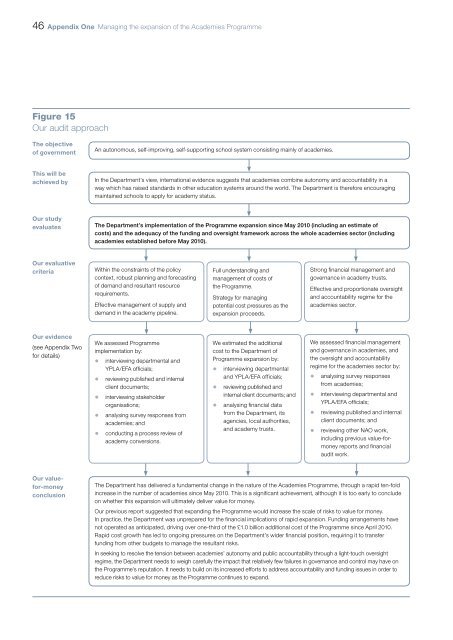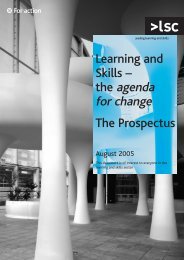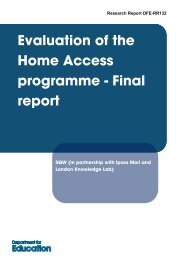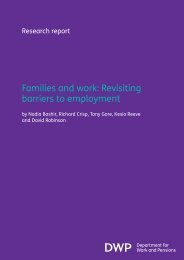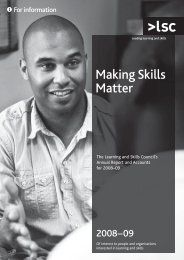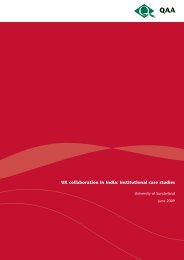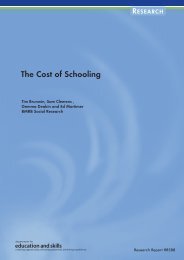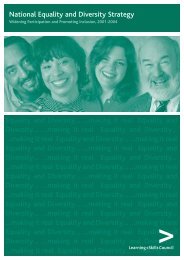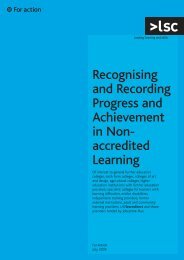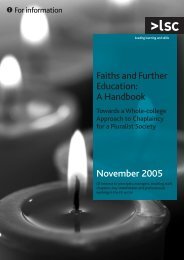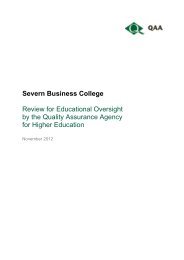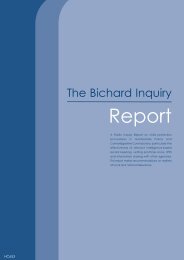Full Text (PDF) - Official Documents
Full Text (PDF) - Official Documents
Full Text (PDF) - Official Documents
Create successful ePaper yourself
Turn your PDF publications into a flip-book with our unique Google optimized e-Paper software.
46 Appendix One Managing the expansion of the Academies Programme<br />
Figure 15<br />
Our audit approach<br />
The objective<br />
of government<br />
An autonomous, self-improving, self-supporting school system consisting mainly of academies.<br />
This will be<br />
achieved by<br />
In the Department’s view, international evidence suggests that academies combine autonomy and accountability in a<br />
way which has raised standards in other education systems around the world. The Department is therefore encouraging<br />
maintained schools to apply for academy status.<br />
Our study<br />
evaluates<br />
The Department’s implementation of the Programme expansion since May 2010 (including an estimate of<br />
costs) and the adequacy of the funding and oversight framework across the whole academies sector (including<br />
academies established before May 2010).<br />
Our evaluative<br />
criteria<br />
Within the constraints of the policy<br />
context, robust planning and forecasting<br />
of demand and resultant resource<br />
requirements.<br />
Effective management of supply and<br />
demand in the academy pipeline.<br />
<strong>Full</strong> understanding and<br />
management of costs of<br />
the Programme.<br />
Strategy for managing<br />
potential cost pressures as the<br />
expansion proceeds.<br />
Strong financial management and<br />
governance in academy trusts.<br />
Effective and proportionate oversight<br />
and accountability regime for the<br />
academies sector.<br />
Our evidence<br />
(see Appendix Two<br />
for details)<br />
We assessed Programme<br />
implementation by:<br />
• interviewing departmental and<br />
YPLA/EFA officials;<br />
• reviewing published and internal<br />
client documents;<br />
• interviewing stakeholder<br />
organisations;<br />
• analysing survey responses from<br />
academies; and<br />
• conducting a process review of<br />
academy conversions.<br />
We estimated the additional<br />
cost to the Department of<br />
Programme expansion by:<br />
• interviewing departmental<br />
and YPLA/EFA officials;<br />
• reviewing published and<br />
internal client documents; and<br />
• analysing financial data<br />
from the Department, its<br />
agencies, local authorities,<br />
and academy trusts.<br />
We assessed financial management<br />
and governance in academies, and<br />
the oversight and accountability<br />
regime for the academies sector by:<br />
• analysing survey responses<br />
from academies;<br />
• interviewing departmental and<br />
YPLA/EFA officials;<br />
• reviewing published and internal<br />
client documents; and<br />
• reviewing other NAO work,<br />
including previous value-formoney<br />
reports and financial<br />
audit work.<br />
Our valuefor-money<br />
conclusion<br />
The Department has delivered a fundamental change in the nature of the Academies Programme, through a rapid ten-fold<br />
increase in the number of academies since May 2010. This is a significant achievement, although it is too early to conclude<br />
on whether this expansion will ultimately deliver value for money.<br />
Our previous report suggested that expanding the Programme would increase the scale of risks to value for money.<br />
In practice, the Department was unprepared for the financial implications of rapid expansion. Funding arrangements have<br />
not operated as anticipated, driving over one-third of the £1.0 billion additional cost of the Programme since April 2010.<br />
Rapid cost growth has led to ongoing pressures on the Department’s wider financial position, requiring it to transfer<br />
funding from other budgets to manage the resultant risks.<br />
In seeking to resolve the tension between academies’ autonomy and public accountability through a light-touch oversight<br />
regime, the Department needs to weigh carefully the impact that relatively few failures in governance and control may have on<br />
the Programme’s reputation. It needs to build on its increased efforts to address accountability and funding issues in order to<br />
reduce risks to value for money as the Programme continues to expand.


